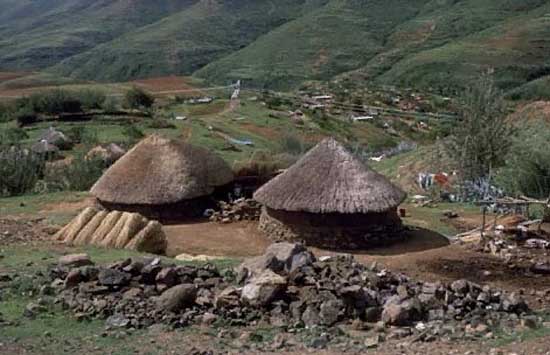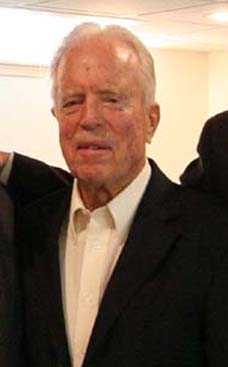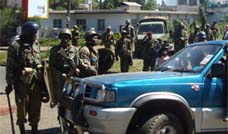
Modern amenities were very scarce in the poor country. Electrical wires could be seen running over the tops of some houses, but most people are too poor to afford the luxury. Generally, she said, a central building in the village markets would have electricity, but sometimes the building's owners weren't hooked on to the provided electricity. "They were quite industrious in how they would supply electricity," Nolan said. Often, they would have a solar panel, a car battery and an up-converter to provide electricity. "They would often play radios, and one could hear American music everywhere there was a radio." She said not many Americans have heard of Lesotho, but everyone in Lesotho had heard of America. Nolan said American culture, music and clothing styles were everywhere. "And almost everyone has a cell phone," she said. Used cell phones can be purchased there for as little as $7 U.S. currency and most people use a "pay-as-you-go" plan. Tower coverage was spotty, but usually, she said, people could walk a short distance to find a signal for their phones.
Rebecca Nolan served 2 1/2 years in Lesotho as a Peace Corps volunteer
Crossville native returns home following 2 1/2-year stint in Peace Corps in Africa
By BRADEN WILLIS Of The Times Staff
Published: Friday, November 30, 2007 4:31 PM CST
Crossville native Rebecca Nolan has returned to her White County home after serving some 2 1/2 years in Lesotho (pronounced LEE-SOO-TOO), Africa, as a Peace Corps volunteer.
Nolan is the daughter of Charles and Gail Nolan of rural Crossville. She entered the Peace Corps in June 2005.
Nolan's home in Lesotho has no running water or electricity. The home had a thatched roof and cement floor. The village where she lived is surrounded by mountains in all directions and is in Thaba-Tseka, one of ten districts--something akin to a county--in the small, land-locked nation, which is surrounded on all four sides by South Africa.
Nolan said her primary duties were to instruct middle school-aged students on agriculture and to work with the families to grow food more efficiently. She said the climate in the mountainous region is cool, not unlike autumn in southern Illinois. It is possible to grow crops in the mild climate, even though temperatures can get quite chilly at night.
"We used a system to cover the plants at night to protect them from the cold," Nolan said. The system utilized a short wall of rocks to surround the gardens, she added. The rocks would absorb heat from the sunlight during the day and when covered at night, the rocks would radiate the stored heat. A large covering was placed over the gardens to contain the radiated heat.
"We used whatever was available for a covering," she noted, adding that materials were scarce. One farmer was able to scrounge a large, clear plastic sheet that didn't have to be removed during the day. However, most residents weren't that fortunate. Many used feed bags, seed bags, straw or even brush. "Whatever they could find," she said.
Modern amenities were very scarce in the poor country. Electrical wires could be seen running over the tops of some houses, but most people are too poor to afford the luxury. Generally, she said, a central building in the village markets would have electricity, but sometimes the building's owners weren't hooked on to the provided electricity.
"They were quite industrious in how they would supply electricity," Nolan said. Often, they would have a solar panel, a car battery and an up-converter to provide electricity. "They would often play radios, and one could hear American music everywhere there was a radio."
She said not many Americans have heard of Lesotho, but everyone in Lesotho had heard of America. Nolan said American culture, music and clothing styles were everywhere.
"And almost everyone has a cell phone," she said. Used cell phones can be purchased there for as little as $7 U.S. currency and most people use a "pay-as-you-go" plan. Tower coverage was spotty, but usually, she said, people could walk a short distance to find a signal for their phones.
Nolan said the biggest problem facing the Basotho people is HIV/AIDS. "The middle generation is dying off, leaving children as orphans or to be raised by their grandparents," she noted.
Nolan said a number of factors are contributing to the spread of the disease. Most people practice what Nolan described as "serial monogamy." For instance, young men may have a wife at home in Lesotho, but many are gone for as long as a year working in the mines in South Africa. Many of the men take a new wife in South Africa near where they work. "They have two families," she said. "And, oftentimes, the wives aren't faithful when the husband is either at work or at home."
Adultery is not "looked down on as much." She said the society is male-dominated and practices serial monogamy, which tends to overlap, despite a strong Christian influence from the many missionaries in the area. The majority of residents are practicing Catholics.
Nolan's village and a handful of surrounding villages went together and constructed a central church called--in their native tongue--"Sefapanong," which translates in English to "place of the cross." She thanked her home church, St. Polycarp in Carmi, for donating funds for a concrete floor and seating for the church.
Unlike America, where it is said most HIV/AIDS cases are among the homosexual community and those who share needles, Nolan indicated many women in Lesotho are infected with the virus. She said the statistics, which indicate roughly a third of the population has the virus, are skewed because so many of the people are not tested. The majority of those tested are pregnant women who go to a clinic for pre-natal care and to give birth.
Also contributing to the HIV/AIDS rate is misinformation that some of the area men believe to be true. Nolan recalled conversations with some of the men who believed the statistics were overblown, believing many of the deaths attributed to AIDS were actually the result of tuberculosis or even the common cold. Others believe "the white man" is causing the infections to spread among the black population.
Other contributing factors Nolan listed were the lack of availability of condoms, health care and HIV-fighting drugs.
Nolan described life in Africa as having a "much slower pace," with villagers spending time socializing around a radio. Villagers often mix a home-brewed alcoholic beverage she described as "very heavy," so much so, she added, it's impossible to drink enough of it to get very drunk. "A little buzzed, maybe," she said. "They're very inter-dependent on one another. The villages are very close-knit."
She said the children rarely have toys, as Americans may think of them. Many of the boys handcraft animals from clay and fashion soccer balls by melting together plastic they can scrounge. The girls play games similar to hopscotch.
Despite the threat of poverty and HIV/AIDS, Nolan said, "I could see hope in the younger generation because of the education they are receiving."
Nolan said she is hopeful her formal education (she holds a bachelor's degree in crop science from the University of Illinois and a master's degree in crop science and horticulture from Ohio State University) and the life experience she has gained in her service in the Peace Corps will translate to a job where she can continue to study crop science and work to develop better crops and improved methods of raising crops.
Though she wants to settle in her hometown, she said the job opportunities in the field may be limited, but she wants to stay in the Midwest.
She will be home for a little while to take a break and encourages anyone with questions about her experiences to call her at 966-3883. "Please, feel free to call with questions about Lesotho or the Peace Corps," she said.









